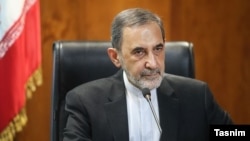“Once again, some pretentious governments, indifferent to their own interests and those of the region, have brough up the issue of the Zangezur Corridor and are knocking on every door to advance their illegitimate goals in the South Caucasus,” Ali Akbar Velayati said in an X post late on Monday.
“I reiterate that any government in or outside the region intending to repeat failed experiences of the past will meet with Iran’s strong response,” Velayati wrote without naming anyone.
His tweet followed reports that U.S. President Donald Trump will host the leaders of Armenia and Azerbaijan at the White House on Friday.
Velayati claimed late last month that the United States as well as “certain pan-Turkist movements” are behind the Azerbaijani demands for the extraterritorial corridor. He said they want to “sever Iran’s link with the Caucasus and impose a land blockade on Iran and Russia in the region’s south.” Tehran will thwart their plans with a “policy of active prevention, rather than passive reaction,” Velayati added in a speech cited by Iranian news agencies.
The corridor demanded by Baku would connect Azerbaijan to its Nakhichevan exclave through Syunik, the only Armenian region bordering Iran. The latter is strongly opposed to its opening, fearing a loss of its common border or direct transport links with Armenia.
Earlier in July, Armenian Prime Minister Nikol Pashinian confirmed that the U.S. has suggested that the transit of people and cargo through Syunik be administered by a U.S. company. He signaled readiness to accept such an arrangement which might also involve a 100-year U.S. lease on the corridor. Pashinian and Iranian President Masoud Pezeshkian as well as senior Armenian and Iranian security officials spoke by phone in the following days.
Tehran indicated last week its strong opposition to the U.S. proposal. The Russian Foreign Ministry also criticized the proposal, saying that it is part of the West’s continuing efforts to sideline Russia and Iran.
Pashinian insisted through a spokeswoman afterwards that a third-party control of the transit routes for Nakhichevan would not compromise Armenian sovereignty over Syunik. Armenian opposition leaders claim the opposite. They say that Pashinian has agreed to open the corridor.





